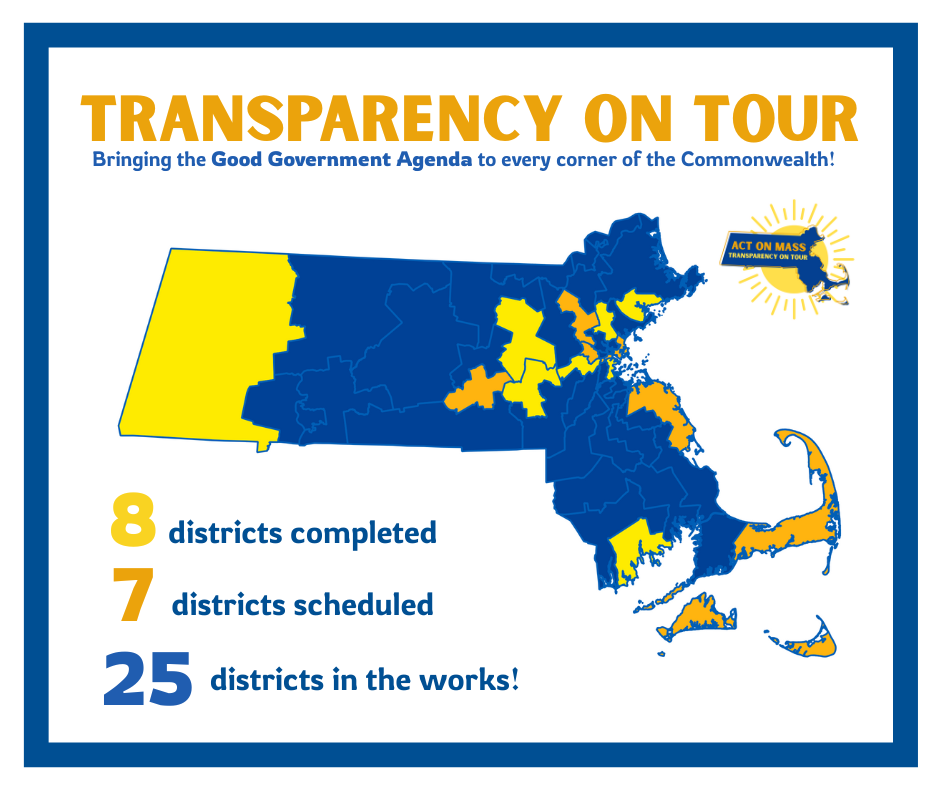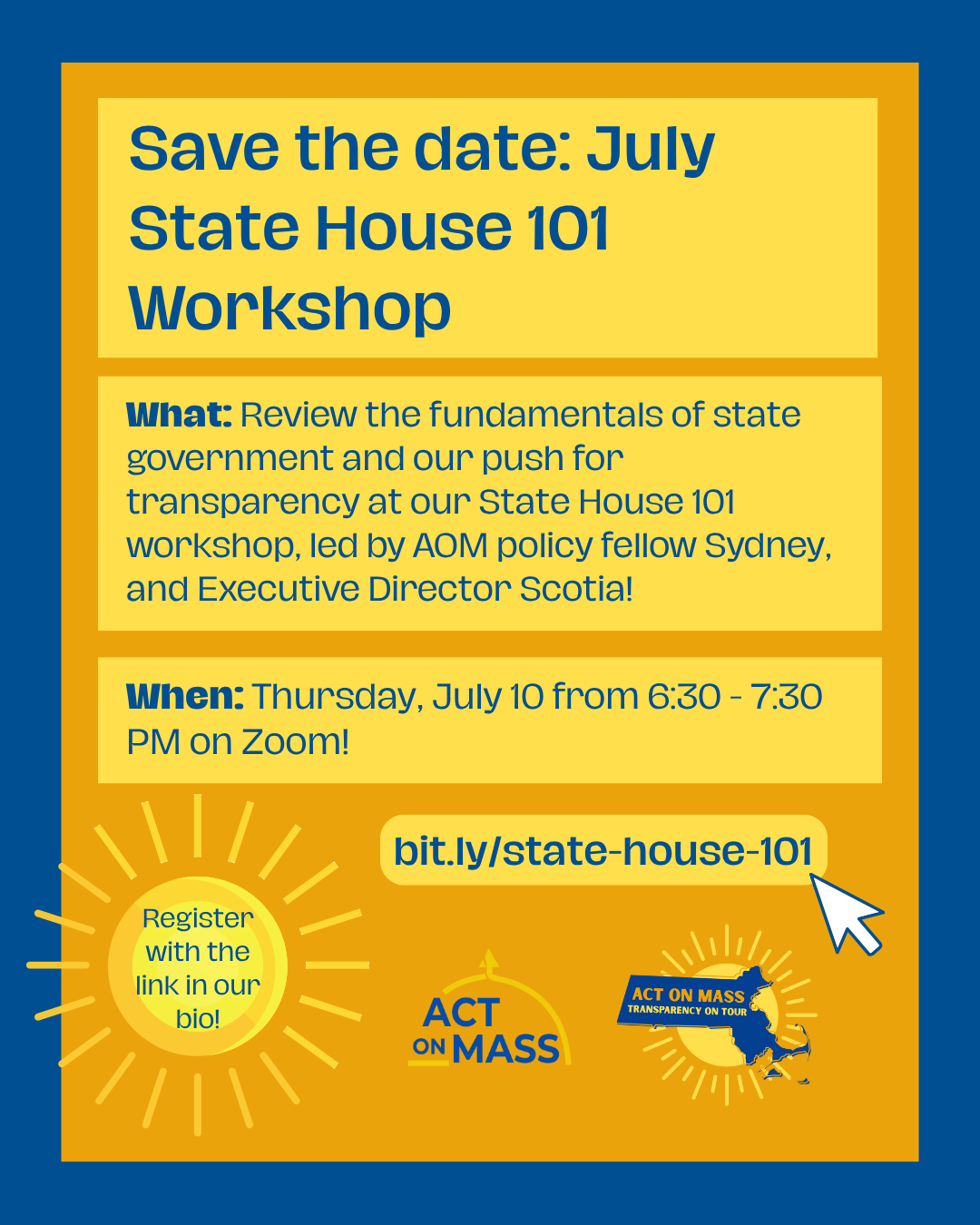Good morning,
Happy long weekend! You know, I’ve heard there’s no better way to celebrate the 249th year of our nation's independence than by exercising your democratic right to harass your state legislator about the issues that are important to you...
It’s a task that was just made slightly easier by the passage of new rules reforms, after years of advocacy from Act on Mass and allies for in the movement for transparency. This was the first week in which the new rules were in place. Right off the bat, we got some prime examples of what this added transparency brings.
This week, House members of the Committee on Public Health voted out 5 bills, including one to legalize physician-assisted suicide. Although public opinion has shifted on this issue over the years, it tends to draw strong opinions for and against. Therefore, the public has an interest in knowing where our representatives stand on it. Yet, for several sessions in a row, the bill has lingered in committees with private votes, leaving us waiting in the dark for action.
The new Rules made two changes to this process this week. For one, the new House rolling deadline forced House committee members to act on this legislation by July 2nd. Last session, this same legislation was not even assigned a hearing until October and the Committee on Public Health did not act on it until March of the second year of session. This favorable vote 6 months in gives advocates and opponents much more time to mobilize and stage meaningful discussions on what should be the fate of this legislation.
Secondly, our reps had to go on the record! Thanks to our years of advocacy, the House committee votes in favor of this bill and the four others were made public. These votes also made it into press coverage of the issue, connecting readers with crucial information that was unavailable until just last week.
Just don’t expect to find the committee votes easily. Rather than being posted on the bill pages, which are supposed to show actions on the fate of legislation, the committee’s votes are inexplicably buried in a secondary “Documents” tab of the committee hearing’s livestream page– from April! I could have expected they’d try to find a backdoor to keep this information hidden, but this was pretty creative. Some next steps for our movement!
If this whole process is sounding like gobbledygook, I’ve got another idea for you: come to our upcoming State House 101 workshop on July 10th, 6:30 pm! We’re scheduling regular workshops to pair with our Transparency on Tour dates, for new and old supporters to review the legislative process and discuss the need for transparency. Sign up at the link here:
---
State House Scoop
Act on Mass' earliest budget review ever
In the end, legislators did not end up busting their “Curse of the Bambino” and the fiscal year did, in fact, start without a budget signed by Gov. Healey. Still, we can give some credit: it is the first time since 2016 that the General Court did their part of the bargain before the fiscal year began. The conference committee released the finalized FY 2026 budget this Sunday and it was approved by House and Senate Monday– one day before the new fiscal year. This gave Governor Healey 10 days to sign it and offer line-item vetoes, which she did yesterday.
Legislative leaders explained that they were pushed to act more swiftly this year due to the uncertainties of federal funding from Washington. Lawmakers in Congress approved Trump’s “Big Beautiful Bill” this week, implementing drastic cuts to Medicaid and SNAP benefits that can be expected to impact hundreds of thousands of MA residents.
This uncertainty also prompted our budget negotiators to spend more from Fair Share funds than originally anticipated (prompting some criticism from Fair Share proponents) and to leave themselves roughly $800 million of “wiggle room”– anticipated but unspent revenue that can be used later to plug holes.
Governor Healey’s signing of the budget this week, only 4 days after it was approved by the General Court, was the fastest a governor had moved on a budget bill since 2001. In an interesting move, she vetoed roughly $130 million in spending as a “cost saving” measure and delayed payment of lawmaker’s earmarks until the fall.
The ultimate FY 2026 budget has some pieces that match our progressive vision, and some that don’t. For a full run-down of all the top hits, I recommend checking out the preliminary analysisdone by our friends at Mass Budget. For our Scoop today, we will discuss two key pieces: one disappointment and one win.
Disappointment: No relief for bar advocates
The final budget included a disappointing omission that will impact state-appointed attorneys and the defendants that they represent.
Bar advocates represent 80% of defendants in MA who cannot afford a lawyer. Yet, in Massachusetts, bar advocates’ are paid woefully less than our peer states. A bar advocate in MA is paid $65/hr in district courts– a fee which must cover staff expenses, license fees, and a required office space, as well as the lawyer’s wage. In comparison, state-appointed attorneys in neighboring states can expect to make $112/hr (RI), $125-$150/hr (NH), or $150/hr (ME). With the private sector offering very lucrative salaries, Massachusetts’ low rates make it difficult to attract and retain enough attorneys to meet defendant need.
As a result, MA’s bar advocates are also overworked. In May, they actually initiated a work stoppage, refusing to take new cases until their pay was raised. As a result, hundreds of defendants are now going without lawyers. This restricts the ability of the courts to hold people pre-trial, including those who have been accused of serious crimes, and forces defendants to wait even longer for justice to be served.
The Senate’s proposed budget included a small pay boost for certain types of cases for bar advocates– not a full delivery on advocates' demands, but addressing the problem with urgency. Yet, even this small boost was cut in negotiations between House and Senate and did not make it to the final version of the budget.
Legislative leaders seem oddly flippant about the impact that this decision will have on our court system and– more importantly– the bar advocates that keep it humming, as well as the defendants that rely on them. Said House Ways & Means Chair Aaron Michlewitz, “We weren’t given any indication that this was hitting a boiling point… it would set a terrible precedent to acquiesce.”
First of all, the work stoppage started in May! It’s July! Work stoppages are usually a last resort in labor negotiations; indeed, advocates attest that their fight for better pay has lasted years now. The degree of the crisis was communicated well enough for the Senate to approve additional funds in their version of the budget, which was finalized May 22nd.
Second of all, Michlewitz estimated that the amount needed to fund the raise that bar advocates are seeking would cost the state roughly $60 million a year– a tiny fraction of our $61 billion budget. This fact risks becoming a Scoop cliché, but that’s just about twice what lawmakers were willing to spend ($25 million) on the Speaker's secret earmark for a single parking garage in Quincy.
Lastly, this rhetoric is just demeaning: it treats a meaningful demand for reasonable pay for a public service like a parent discussing a child’s tantrum. The constitutional rights of people in Massachusetts’ court systems shouldn’t just be a bargaining chip in negotiations. And they certainly shouldn’t have to suffer for not having kissed the ring properly– which, unfortunately, is what it sounds like.
Win: MA says "bye" to brokers fees
One big win that we were hoping for: the proposal to ban renter-paid brokers fees made it into the final version of the bill! This is an issue that we’ve covered recently that could save renters a huge expense at the beginning of the signing process. With this move, legislators finally retire Boston’s status as the last major city in the U.S. allowing landlords to charge tenants for brokers they didn’t hire. This is a huge win for affordability and tenant's rights.
This policy change does come late in the game for most tenants in the Boston area, where leases tend to turn over in September and, thus, get signed in late spring. In the last few months, tenants who could have benefited from this policy were forced to pay these exorbitant fees, while Beacon Hill stalled. Still, it’s a policy change that will impact real lives by reducing barriers to move housing and is a great example of the material changes that our state leaders can deliver for us when we make our voices heard.
Governor Healey was quick to take credit for the change, writing on Twitter: “I’m getting rid of broker’s fees for renters”– although advocates have been pushing for this policy change for years. Nevertheless, the fate of this new law does now rest in the hands of the executive branch to implement. Bay Staters (including landlords!) who do not follow the movements of the legislature might not know that this practice is now illegal and must be informed.
Tenants already experience a power imbalance in negotiations with landlords and must feel empowered to exercise their rights. This is another reason why our work to demystify Beacon Hill is so important: when our legislators pass laws that will help us better protect our communities, we want everyone to know about it! So, if you know someone looking for an apartment right now, let them know: as of August 1st, your landlord has to pay their broker themselves.
Worth reading
We have some reporters in our state doing fantastic work to let us know how decisions on Beacon Hill and in Washington will impact our communities. Spotlighting some of their stories this week:
- ‘I feel that nowhere is safe’: Stories from inside Mass. communities left reeling by the surge in ICE arrests in Boston Globe
- 5 ways Trump tax and spend bill would affect Massachusetts by Abigail Pritchard for New Bedford Light
- As Mass. closes shelter hotels, state funds for rent subsidies run out by Simón Rios for WBUR
Transparency on Tour: Progress Report

Let's keep building our movement! Upcoming dates:
- Lexington Farmers Market, July 8th - 2 pm - 6:30 pm at Worthen Road Practice Field, Lexington
- International Festival, July 13th - 12 pm - 5 pm at Village Green in Hyannis
- Allston/Brighton Organizing Fair, July 14th - 5:30 - 8:30 pm at PSF Community Center in Brighton
- REC Farmers Market Worcester, July 18th - 9 am - 12 pm at Beaver Brook Park in Worcester
- East Boston Farmers Market, July 23rd - 3 pm - 6:30 pm at Central Square Park in East Boston
If one of these are in your district or a district you want to visit, join us to table!
HELP US HIT 40 DISTRICTS THIS SUMMER>>
Missed a Scoop or two? You can find a full archive of all past Saturday Scoops on our blog.
Syd's Sprinkles: Reform or Regression? Let’s talk about Governor Healey’s plans for MCI-Framingham
Governor Maura Healey recently announced a $360 million plan to renovate MCI-Framingham, citing the need for “an investment in people, a commitment to second chances, and a responsibility to build a safer future for communities statewide,” as a justification for spending what would amount to about nine times the cost of building a completely new facility [paywall].
Not only is this plan incredibly expensive, it would also be a regression in reforming the criminal justice and prison system in the state. Creating more space for a population of incarcerated people that has been steadily declining is simply counterintuitive.
Given that the current federal administration has been actively fighting to withhold funding for progressive and reform-based projects from our state, the funds that would be used for this proposal should – and easily could – be used for more productive projects that would support decarceration and rehabilitation efforts.
The issue that advocates, including formerly incarcerated women who spent time in MCI-Framingham, have with this proposal centers around the need for a better use of funding. They too agree that there is a need for better living conditions that don’t pose hazards to the health of the women in MCI-Framingham, but they argue that the funding needs to be used in better, more cost-effective ways that center vital decarceration projects rather than the rebuilding of a prison that holds less than half of its capacity [paywall].
For years, anti-incarceration and reform advocates have spoken out about how building more prisons in the state will only hurt our communities.
In a post shared by Families for Justice as Healing, they wrote that $360 million could ensure a $50,000 annual income for every women inside MCI-Framingham for the next 30 years. So, rather than centering the women who are currently incarcerated in MCI-Framingham by ensuring they have access to resources that would have potentially prevented their incarceration in the first place, the Healey administration is centering a remodeling of a prison that is at half capacity.
We urge you to call Governor Healey and your legislators to voice your opposition to this $360 million project. You can find the resources to do so in the Take Action section:
---
Take Action
Tell Gov. Healey and your reps: no to $360 million in new prison spending!

Our allies at Free Her MA have put together an action kit: use it today to take a stand against new prison spending!
"NO" TO $360 MILLION FOR WOMENS PRISON>>
Join our State House 101 Workshop - July 10th at 6:30!

Join the Act on Mass team for a review of State House basics and why we need the fight for transparency and accountability!
---
That's a wrap! Enjoy your holiday weekend– we'll be back next week.
In solidarity,
Scotia
Scotia Hille (she/her)
Executive Director, Act on Mass
